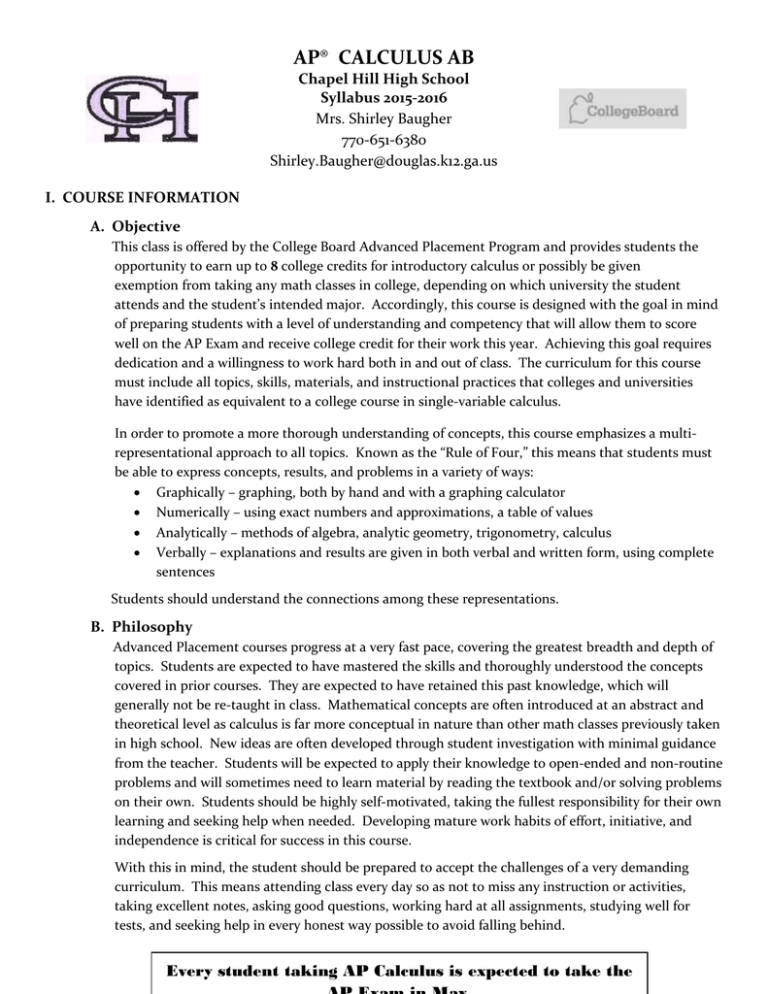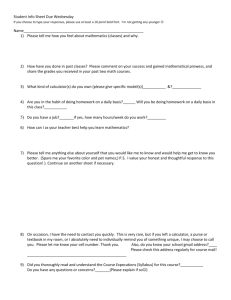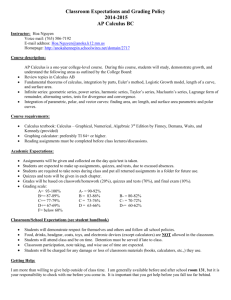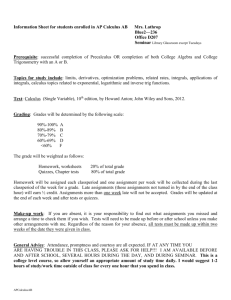
AP® CALCULUS AB
Chapel Hill High School
Syllabus 2015-2016
Mrs. Shirley Baugher
770-651-6380
Shirley.Baugher@douglas.k12.ga.us
I. COURSE INFORMATION
A. Objective
This class is offered by the College Board Advanced Placement Program and provides students the
opportunity to earn up to 8 college credits for introductory calculus or possibly be given
exemption from taking any math classes in college, depending on which university the student
attends and the student’s intended major. Accordingly, this course is designed with the goal in mind
of preparing students with a level of understanding and competency that will allow them to score
well on the AP Exam and receive college credit for their work this year. Achieving this goal requires
dedication and a willingness to work hard both in and out of class. The curriculum for this course
must include all topics, skills, materials, and instructional practices that colleges and universities
have identified as equivalent to a college course in single-variable calculus.
In order to promote a more thorough understanding of concepts, this course emphasizes a multirepresentational approach to all topics. Known as the “Rule of Four,” this means that students must
be able to express concepts, results, and problems in a variety of ways:
Graphically – graphing, both by hand and with a graphing calculator
Numerically – using exact numbers and approximations, a table of values
Analytically – methods of algebra, analytic geometry, trigonometry, calculus
Verbally – explanations and results are given in both verbal and written form, using complete
sentences
Students should understand the connections among these representations.
B. Philosophy
Advanced Placement courses progress at a very fast pace, covering the greatest breadth and depth of
topics. Students are expected to have mastered the skills and thoroughly understood the concepts
covered in prior courses. They are expected to have retained this past knowledge, which will
generally not be re-taught in class. Mathematical concepts are often introduced at an abstract and
theoretical level as calculus is far more conceptual in nature than other math classes previously taken
in high school. New ideas are often developed through student investigation with minimal guidance
from the teacher. Students will be expected to apply their knowledge to open-ended and non-routine
problems and will sometimes need to learn material by reading the textbook and/or solving problems
on their own. Students should be highly self-motivated, taking the fullest responsibility for their own
learning and seeking help when needed. Developing mature work habits of effort, initiative, and
independence is critical for success in this course.
With this in mind, the student should be prepared to accept the challenges of a very demanding
curriculum. This means attending class every day so as not to miss any instruction or activities,
taking excellent notes, asking good questions, working hard at all assignments, studying well for
tests, and seeking help in every honest way possible to avoid falling behind.
Every student taking AP Calculus is expected to take the
C. Description
Whatever happens in life, the one sure thing is change -- prices, income, opinions, population,
weather, velocity, energy, chemistry, planets. To understand and model those changes – that is
where calculus is needed and used. Calculus is the study of change and was invented to answer two
basic questions:
1. Given a quantity that is changing, what is the rate of change?
2. Given the rate of change of a quantity, how much total change has occurred?
There is no doubt that calculus is useful - it is used throughout the sciences and engineering, in
computer technology and statistics; in economics, business, and medicine. Tremendous advances
have occurred in these fields, due in part to their increased use of mathematics. Starting with just a
few basic concepts such as limits and tangent lines, we gradually build the tools for solving
innumerable problems of great practical importance. The major topics of study in AP Calculus AB
include a review of functions, limits and continuity, derivatives and their applications, integrals and
their applications, anti-derivatives and the Fundamental Theorem of Calculus, and an introduction to
differential equations using slope fields.
D. Prerequisites
Before enrolling in calculus, a student should have completed four years of math consisting of two
years of algebra and a year of geometry, plus a strong grounding in elementary functions and their
graphs, including analytic geometry and trigonometry (usually gained in an additional course called
precalculus). Students should show strong mathematical skills as evidenced by a grade of “A” in most
of these courses.
Attitude prerequisites include a willingness to work both in and out of class, a willingness to
collaborate with classmates to foster mutual understanding, and a sincere intent to place out of the
first semester of college calculus rather than repeat it.
E. Format
This is a year-long course on an alternating block schedule. A summer assignment is given to help
students review necessary Pre-calculus skills and concepts.
II. MATERIALS
A. Supplies Required Every Day: 2-inch 3-Ring Binder used exclusively for this class,
college-ruled notebook paper, pencils and pens,
Recommended: Graphing calculator, flash drive, graph paper, ruler, highlighters, colored
pencils, markers, white-out, scissors, glue stick
All students need a graphing calculator for use in class as well as doing assignments at home.
The TI-84Plus is the model that will be used in class, although the TI-89 and the TI-Nspire are also
excellent. Please go to www.CollegeBoard.com and read their “Calculator Policy” for specific
guidelines regarding allowable calculators on the AP exam.
There are four necessary skills that students are expected to know how to do on their calculator:
1. Plot the graph of a function within an arbitrary viewing window
2. Find the zeros of functions (i.e., solve equations numerically)
3. Numerically calculate the derivative of a function at a given value
4. Numerically calculate the value of a definite integral.
B. Textbook
Finney, Demana, Waits, Kennedy. Calculus: Graphical, Numerical, Algebraic (AP edition).
Pearson Prentice Hall, 3rd edition.
C. Additional Resources
1. Students are strongly urged to purchase one of the AP Exam preparation books available in
bookstores and use it regularly.
2. Supplemental Texts:
Anton, Bivens, and Davis. Calculus: Early Transcendentals. John Wiley & Sons, Inc., 8th ed.
Briggs, Cochran, Gillett. Calculus, AP Edition. Pearson, 2014.
Foerster, Paul A. Calculus: Concepts and Applications. Key Curriculum Press, 2nd ed.
Hughes-Hallett, Gleason, McCallum, et al. Calculus. John Wiley & Sons, Inc., 5th ed.
Larson, Hostetler, Edwards. Calculus. Houghton Mifflin Company, 8th ed.
Ostebee and Zorn. Calculus from Graphical, Numerical, and Symbolic Points of View. Houghton
Mifflin Company, 2nd ed.
Rogawski, Jon. Calculus for AP. W. H. Freeman and Co., 2nd ed.
Smith and Minton. Calculus: Early Transcendental Functions. McGraw-Hill, 4th ed.
Stewart, James. Single Variable Calculus: Concepts & Contexts. Thomson Brooks/Cole.
Strang, Gilbert. Calculus. Wellesley-Cambridge Press, 1991.
3. Technology
Promethean Board and Projector, with relevant software on computer
Document Camera
TI-ViewScreen with overhead projector
Many internet sites will be used whenever applicable.
Get A Five: Online AP Test Prep
https://www.getafive.com/
Student instructions
1. Visit getafive.com and click on "I'm a student".
2. On the Students page, choose "AP Calculus AB".
3. On the AP Calculus AB page, click on the "Enroll now" button.
4. Create an account or log in if you're already signed up.
5. You're now in your personal Study Room.
6. Click on the "Join a Class" tab on the left and enter this code: GG2Z3R6
4. Other Printed Resources
Free-Response Questions from previous AP Calculus exams that have been released by the
College Board (and other materials available on their website)
Cade, Caldwell, Lucia. Fast Track to a 5: Preparing for the AP Calculus AB and Calculus BC
Examinations. Brooks/Cole, 2014.
Foerster, Paul A. Calculus Explorations. Key Curriculum Press, 1998.
Howell and Montgomery. Be Prepared for the AP Calculus Exam. Skylight Publishing, 2005.
Kamischke, Ellen. A Watched Cup Never Cools. Key Curriculum Press, 1999.
III. CLASS STRUCTURE
A. General Procedure
The daily routine will revolve around teacher lecture with careful, detailed explanation, proofs,
examples, visual aids, and demonstration. Student discussion and questions are a necessary part of
the learning process. Most classes will include some time for guided and independent practice.
Calculator exploration will be an integral part of each lesson, although students still need to be able
to graph and solve problems using paper-and-pencil. There will be a homework assignment almost
every day. On a regular basis, students will be expected to show solutions to homework problems at
the board and provide verbal explanation of the solution method to the class.
Contextual situations are used to apply many concepts. Students often work in groups when
investigating a new topic numerically or graphically and when working on problems given during
class.
B. Assessment
1. AP Style TESTS will be given approximately every 3-4 weeks. Expect every test to be
CUMULATIVE with Multiple Choice and Free Response questions as well as sections that are
both calculator required and calculator not allowed.
2. There will be three types of QUIZZES given in class:
a. The first type will focus on specific knowledge called “Things to Know Cold”. These will be
given approximately once per month. They will cover all required precalculus information that
you are expected to have learned for Calculus, as well as key theorems, definitions, and formulas
as we progress through the year.
b. The second type is called “Mastery Quizzes” and will focus on foundational skills. These will
cover the 3 main topics of Limits, Derivatives, and Integrals. You must score at least 93% in order
to pass the quiz, and you must re-take the quiz until you achieve this level of mastery.
c. The third type of quiz will be “partner quizzes” and can be over any topic we are learning.
They can be announced or unannounced and may be at the beginning, middle, or end of class.
C. Grading Plan
Tests
Quizzes
Problem Sets
Homework
Final Exam
50%
15%
15%
10%
10%
AP Calculus Exam – Thursday, May 5, 2016 at 8:00 am !!!
IV. DAILY STUDENT RESPONSIBILITIES
I want you to learn math and be successful in this class, and in order for that to happen, the following
policies need to be in place to encourage you to make GOOD CHOICES which will give you the greatest chance
of achieving great success this year:
A. Academic Integrity: It is permissible to discuss problems with other students, relatives, tutors, etc.
It is not permissible to copy another student’s work or try to take credit for someone else’s effort. This
includes but is not limited to copying another student’s homework or in-class assignment, letting
someone else copy your work, having another student’s paper in your possession, copying answers from
the Internet, looking around or talking during a test or quiz, using a cheat-sheet for a quiz or test, etc.
No grade is worth cheating over. I take this very seriously, and it is hard to rebuild trust. If you can’t
explain what you wrote down, then you are cheating. Students who are suspected of cheating will be
given either a zero or alternative assessment, the parent will be contacted, and he/she may be reported to
an administrator for disciplinary action.
Understand together. Write it up alone.
B. TESTS and QUIZZES
1. Tests must be taken in one sitting. Students cannot expect to begin a test or quiz and then
return at a later time to continue working. It is the student’s responsibility to study and be
well prepared before taking a test. **If a student arrives LATE UNEXCUSED for a quiz or
test, extra time will NOT be given to complete his/her work.
2. If you are absent only on the review day before a test and the class does not cover any new
material, then you will take the test on schedule with the rest of the class.
3. If you are absent only on the day of a test, you will be expected to take the test immediately
upon the first day of your return to class. **Per Board Policy in the Student Handbook, missed
tests can only be made up if you have a VALID EXCUSED absence, so make sure you have your
excuse note.
4. All tests must be made up within 10 school days of the original test date or a grade of zero will
be entered.
5. If you are absent for an extended period, we will work out a schedule for making up work when
you return.
C. Homework
In a math class, one cannot master the material without PRACTICE. Therefore, homework is a very
important part of this course and your grade. If you choose not to do homework, you will not do
well in this course. DO NOT just say “I don’t get it” and then quit – find other strategies!! Learning
mathematics is a process which involves struggling through your confusion until things come together
and make sense. Being stuck is part of the problem-solving process, probably the most important part
because this is where the learning occurs!
1. Homework will be assigned and checked on a regular basis for completeness, although
occasionally an assignment may be checked for accuracy.
2. To receive full credit, you MUST show all your work on your homework. If you don’t
show your work, you may not receive credit for the assignment.
3. Papers that are handed in to me MUST have your NAME, date, and the assignment
(page and problem numbers). **I will NOT accept papers done in red or pink ink.**
4. Assignments made or announced prior to a student’s absence will be immediately due
upon the student’s return to class.
5. For an absence on the day an assignment is given, students will be given one day for
each day absent to complete and turn in make-up work. Daily Assignments should
always be made up if you are absent, whether excused or unexcused.
6. In the spirit of “mastering the standards”, the only way that late work is accepted is if
the student comes to my room before or after school and completes an assignment in my
presence with minimal assistance from anyone (must be before the test on that unit).
Most assignments are worth 2 POINTS. There is no reason you shouldn’t get most of the
homework points if you do all of your homework and make an honest effort. The answers do not
all have to be correct, but they should not be all wrong either.
2 points = most problems done and work looks good
1 point = incomplete, didn’t show work, mostly incorrect, sloppy, minimal effort, …
you did the assignment but do not get credit because of copying, cheating, etc..
0 points assignment turned in but barely anything done at all, doesn't qualify to earn credit
you were in class but did not do the assignment
M = Missed and must be turned in within allowed number of days with excuse note
The single most important way to study for tests is to master the homework each day!!!
D. Hall Passes: Since school policy does not allow hallpasses to be issued during the first fifteen
minutes or the last fifteen minutes of class, please use your time wisely between classes to go to the
restroom, your locker, etc… Do not interrupt while I am teaching to ask for a hallpass, and NO
hallpasses will be given during a test or quiz, even if you are finished. Besides these things, if you need to
use the restroom or get some water, then you need to ask for permission and then sign out and take the
pass with you. Upon your return, you need to sign back in. If you cannot follow these rules or ask too
frequently, you will be placed on restriction.
**Going to any area other than the place you specified, or staying gone from class longer than reasonable,
will result in an office referral.
E. Extra Help: After-school help will be available just about every day. The only exceptions are when
the teacher has meetings, duty, or other commitments. The teacher will let students know in advance, if
possible, when she will not be available. This is updated on the front board in the classroom and on the
school website each week. Bear in mind, however, that if you expect extra help outside of class, then you
need to be actively involved IN CLASS taking notes and doing all that is asked of you. Personal time
outside of class will not be given to students who choose to waste time in class.
F. Extra Credit: Extra credit assignments are not given to students on an individual basis just to raise
your grade. It is up to the student to do his/her best on all class assignments and tests on a regular basis.
I expect that you will work hard to complete all assignments asked of you. I
expect that you will do whatever is necessary outside of class to be prepared for
every class, and I expect that you will be respectful and studious in class.
G. The “Nitty-Gritty”
1.
2.
3.
4.
5.
6.
7.
8.
9.
10.
11.
(don’t say I didn’t warn you)
NO FOOD in class … and only WATER to drink in a closed-top bottle
No profanity, vulgar language, class disruption, disrespect, or excuses
No sleeping or putting your head down on your desk
No hats, hoods, sunglasses, earphones, cell phones, etc…
No make-up, lotion, spraying perfume, doing hair, etc ...
Do not throw anything (even at the trash can). Do not get out of your seat to throw away trash
during class. Keep trash at your desk until the bell rings and then dispose of it properly on your way out.
Do not sit anywhere other than your assigned seat. Do not sit sideways with your legs in the aisle.
Do not adjust the classroom thermostat or use any items without permission.
Purses/backpacks/bags may not be kept on your desk or in your lap (must be on the floor).
Working on assignments for other classes is prohibited.
Do not stand at the door at the end of class waiting for the bell to ring.
**I will be using Remind 101 to send text messages about tests, quizzes, etc. Please sign up by
calling (770)212-9883 with class code _________________________________.
This will be a rigorous course, but you WILL SUCCEED if you work hard and actively participate in
class. You are an exceptional group of people and I know you are destined to do great things. I am very
excited to have you in my class and look forward to working with you this year!!!
Mrs. Shirley Baugher
CHH Math Department
**Teacher reserves the option to make changes to this syllabus if needed.
PLEASE RETURN TO TEACHER
Mrs. Baugher - Math
PRINT Student’s Name ____________________________________________________________________
Father’s (or male guardian) Name ___________________________________________________________________________
Email address _________________________________________________________________________________________
Phone number for contact during school hours: ___________________________________________________
Mother’s (or female guardian) Name ________________________________________________________________________
Email address _________________________________________________________________________________________
Phone number for contact during school hours: ___________________________________________________
Does your student have regular access to the Internet at home? ______________________________
Does your student have access to a reliable printer at home? ____________________________
What are three adjectives that come to mind when you think of your son/daughter?
___________________________________
____________________________________
_____________________________________
Are there any medical, family, or personal issues of which I need to be aware in order to help me better
work with your child?
If your child is confused or has academic difficulty during the semester, what strategies do you expect
him/her to use to improve their learning?
** I have read the syllabus and I understand Mrs. Baugher’s classroom expectations. I agree that it is the
student’s responsibility to abide by these policies. I also understand that Mrs. Baugher may make any
adjustments to the syllabus that she determines will be in the best interest of students.
Parent Signature
_________________________________________________________
Student Signature _________________________________________________________




